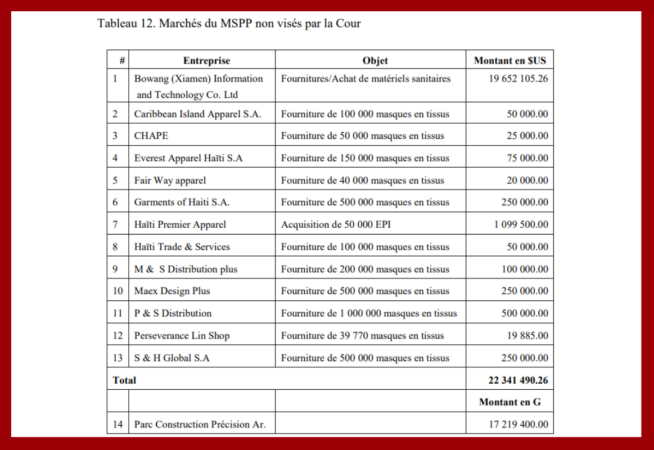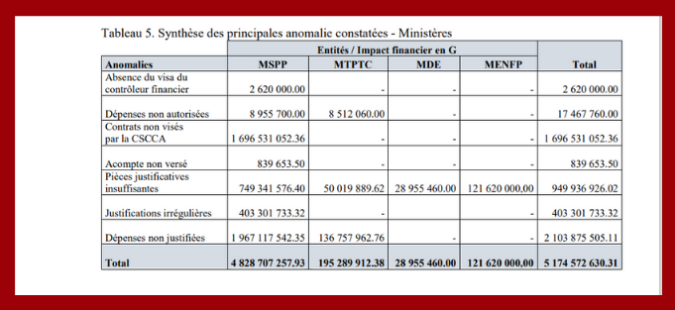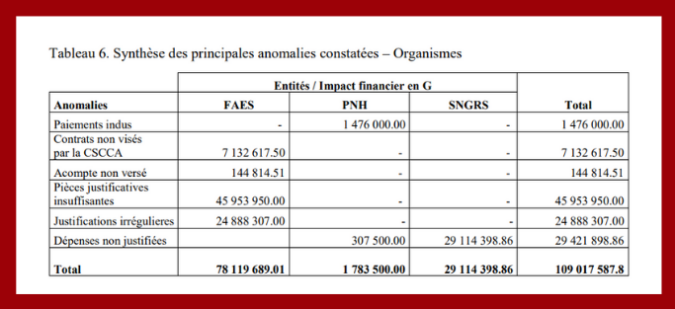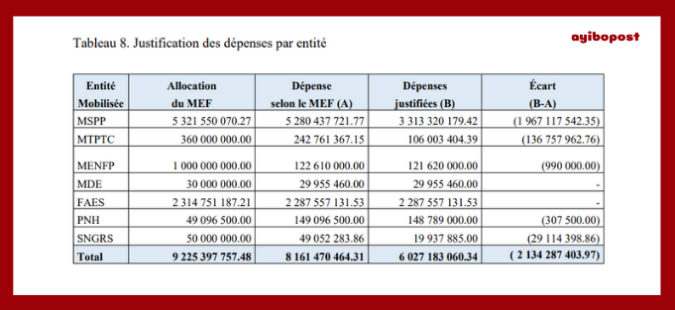Justice is still slow to shed light on this case as well as several other cases of corruption recorded in recent years
Half a dozen state institutions have been singled out for poor spending in the fight against Covid-19, according to a first audit report from the Superior Court of Auditors and Administrative Litigation (CSCCA) published on June 8 2022.
In less than a year, the sum of 9.22 billion gourdes – more than 70 million US dollars – was disbursed by the government of Prime Minister Joseph Jouthe during the presidency of Jovenel Moïse in order to take measures to cope to the health crisis.
More than five billion gourdes spent display anomalies such as non-justification of costs, doubts about the reality of the service provided as well as problems in the accuracy of the amounts paid, according to the CSCCA.
The institution with the highest expenditure, the Ministry of Public Health and Population (MSPP), fails to provide convincing explanations for nearly two billion gourdes allocated by the State in the fight against the pandemic.
Source : CSCCA – Audit report on the management of the government response to the COVID-19 pandemic, period March 2020 – January 2021, Page 52.

Source : CSCCA – Audit report on the management of the government response to the COVID-19 pandemic, period March 2020 – January 2021, Page 53.
As of March 2024, justice is still slow to move forward in this case as well as several other cases of potential corruption recorded at least since the 2010 earthquake.
According to specialists, the CSCCA must issue debt orders against the disastrous management of the officials involved.
“The court will end up making these judgments” essential to prosecute the perpetrators of offenses such as the misappropriation of public property or theft which can be observed in the management of the fund, analyzes to AyiboPost Me Samuel Madistin, president of the Je Klere Foundation.
The CSCCA must issue judgments against the disastrous management of the officials involved.
However, this procedure is not necessary if corruption offenses such as bribery, illicit enrichment, overcharging, insider trading, favoritism, illegal taking of interest are found. so,” underlines Me Madistin. “Because,” the lawyer continues, “these offenses do not require prior authorization to initiate criminal proceedings.”
The government of former Prime Minister Joseph Jouthe declared a health “state of emergency” on the national territory after the introduction of Covid-19 in Haiti at the beginning of 2020.
According to specialists, the “state of emergency” provided for by the constitution of March 29, 1987, amended and the law of April 15, 2010 on the state of emergency promotes corruption because it allows you to make expenses quickly, without going through normal procedures.
Read also: State of emergency and corruption go hand in hand in Haiti
According to the CSCCA audit, almost all public institutions involved in the management of these funds – ministries and other state bodies – are affected by the sometimes very serious anomalies.

Source : CSCCA – Audit report on the management of the government response to the COVID-19 pandemic, period March 2020 – January 2021, Page 35.
The Economic and Social Assistance Fund (FAES) is the second institution behind the MSPP to have spent the most money during Covid-19.
Involved in several corruption scandals in the past, this autonomous body must normally support the government in its strategy to combat poverty.
The FAES had therefore received 2.3 billion gourdes as part of the fight against Covid-19, according to a report from the Ministry of Economy and Finance.
46 million gourdes of expenses present insufficient supporting documents and 24 million display irregular justifications, according to the Court.

Source : CSCCA – Audit report on the management of the government response to the COVID-19 pandemic, period March 2020 – January 2021, Page 35.
In this case, FAES was to grant compensation for loss of income to workers at the Industrial Park of the Industrial Park Company (SONAPI), grant financial assistance to households through Digicel’s MonCash service and distribute food kits.
65% of the kits were practically diverted, according to the CSCCA.
The FAES spent more than 983 million gourdes to carry out MonCash transfers. Doubts persist about how this money was distributed.
The institution intended to identify and register food insecure beneficiaries using the information system of the Ministry of Social Affairs and Labor (SIMAST).
However, at the time of project design, the information relating to the selection of beneficiaries of the service was quite vague, with no geographical distribution of beneficiaries by department and by municipalities with the supporting selection method and criteria.
SIMAST barely covered four municipalities in the South-East department and the data was not updated.
The FAES spent more than 983 million gourdes to carry out MonCash transfers. Doubts persist about how this money was distributed.
According to Digicel officials contacted by AyiboPost, the company – which had not benefited from the transfers – was not involved “neither closely nor remotely” in the choice of beneficiaries.
The MonCash team had received requests totaling one billion gourdes to pay 327,000 people, according to revelations from Gerard Laborde, head of Digicel’s legal section.
“98% of these payments were successfully completed,” Laborde reports to AyiboPost. “At the request of the FAES, we then returned the remaining 2% of the funds that had not been disbursed,” he underlines.
Read also: DCPJ investigations slowed by the illegal sale of SIM Digicel and Natcom
The CSCCA audit raises other questions.
For example, according to the Court, some people selected for this program “did not even have a MonCash account”, which would have “highened the transfer failure rate”.
The institution says it has spent 202 of the 203 million gourdes allocated to subsidizing textile factory workers on partial unemployment due to Covid-19, at the rate of 3,750 gourdes for 53,906 workers.
Contacted by AyiboPost, Georges B. Sassine, spokesperson for the Association of Industries of Haiti (ADIH) declared that the factories had been paid additionally by the Jouthe-Moïse government to manufacture twenty million masks.
Sassine did not communicate the amount received by the factories for the manufacture of these masks or whether they have all been delivered.
For more information on this matter, the spokesperson asked AyiboPost to contact the executive director of ADIH.
Sassine did not communicate the amount received by the factories for the manufacture of these masks or whether they have all been delivered.
Contacted via WhatsApp, the executive director of the structure, Sophia Riboul, did not provide further explanations.
“ADIH does not intend to give an interview regarding this grant,” she responded to AyiboPost, specifying that the institution was only an “information intermediary between the Government and members of the textile sector”.
Contacted twice, the former Director of FAES, Charles Ernest Chatelier, did not want to give an interview. He mentioned a health problem.
Read also: Covid-19: Challenges and chances of success of the Government’s cash transfer program
Economist Etzer Émile sees in this spending a “culture of waste and corruption” linked, according to him, to the “problem of accountability” in the country.
Several of the other institutions involved in this case were guilty of paying companies, despite an unfavorable opinion from legal authorities, purchases denominated in dollars, which remains illegal, not to mention unauthorized and unjustified expenses in a context of almost total opacity on public spending.

Source : CSCCA – Audit report on the management of the government response to the COVID-19 pandemic, period March 2020 – January 2021, Page 38.
According to lawyer specializing in criminal law Me Frantz Gabriel Nerette, the CSCCA report will be a key document when studying the discharge file of ministers or directors general of indexed public institutions.
“Mismanagement implies poorly documented expenditure, but not necessarily a misappropriation of public funds,” analyzes the specialist. “Additional audits for each authorizing officer must be carried out,” continues Nerette.
“But as for PetroCaribe, these additional audits are still slow,” notes Me Samuel Madistin.
Par Fenel Pélissier
Rony Célicourt contributed to this article.
Cover image published by AyiboPost illustrating suspected cases of corruption in Covid-19-related spending in Haiti.
Keep in touch with AyiboPost via:
► Our channel Telegram : Click here
► Our Channel WhatsApp : Click here
► Our Community WhatsApp : Click here











